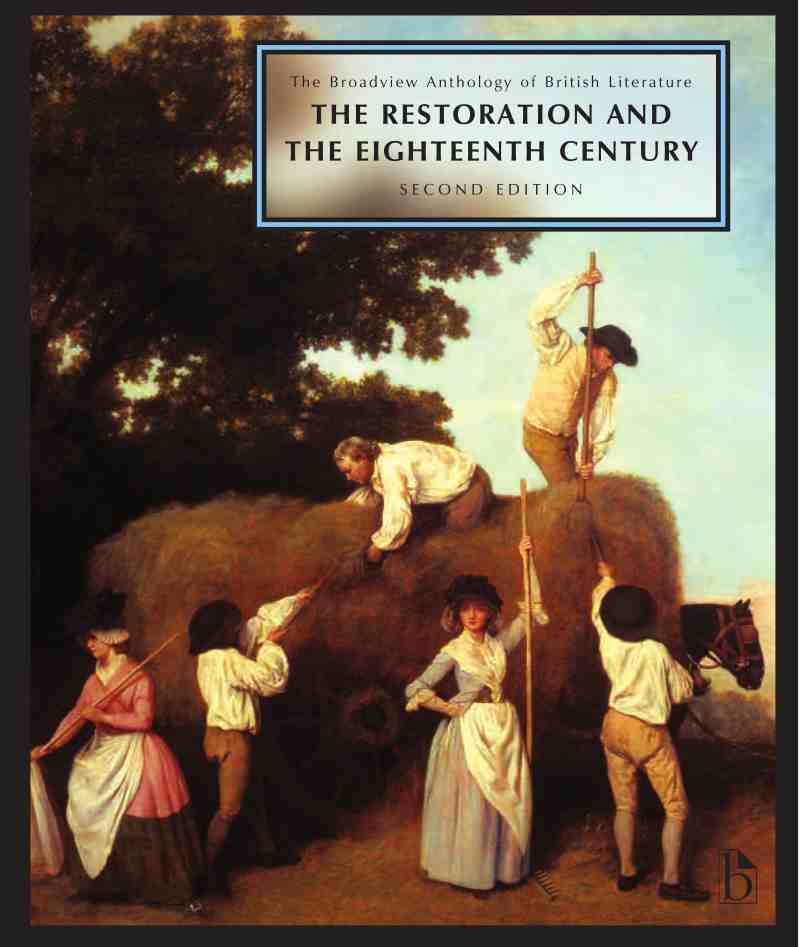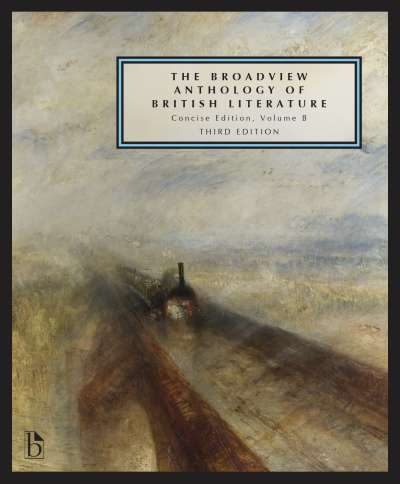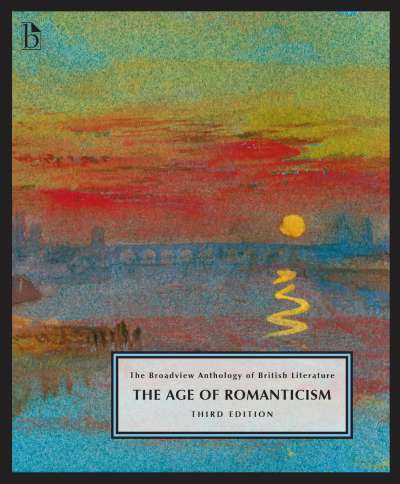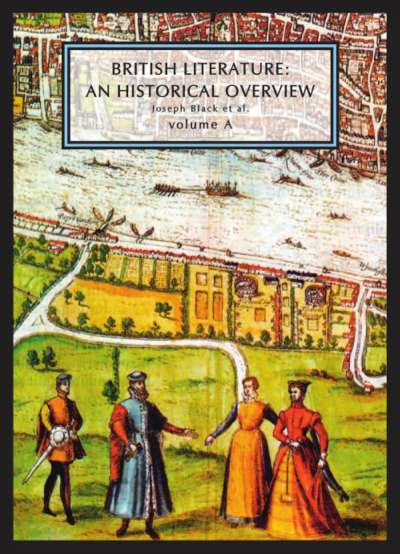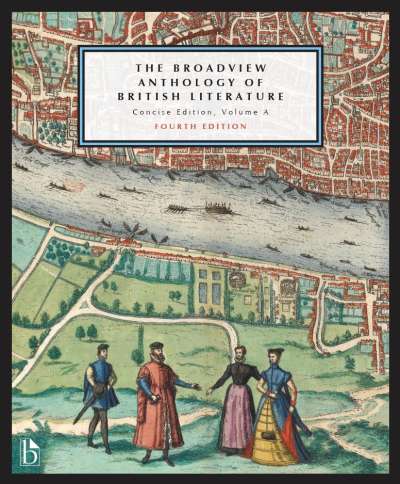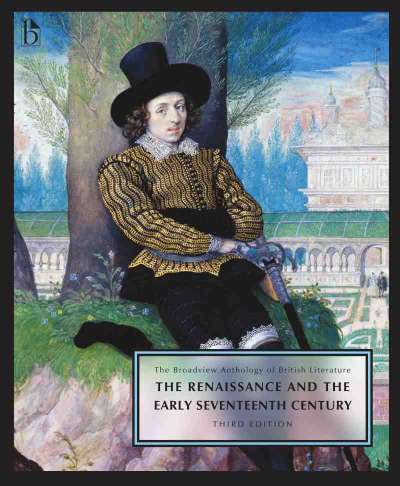In all six of its volumes The Broadview Anthology of British Literature presents British literature in a truly distinctive light. Fully grounded in sound literary and historical scholarship, the anthology takes a fresh approach to many canonical authors, and includes a wide selection of work by lesser-known writers. The anthology also provides wide-ranging coverage of the worldwide connections of British literature, and it pays attention throughout to issues of race, gender, class, and sexual orientation. It includes comprehensive introductions to each period, providing in each case an overview of the historical and cultural as well as the literary background. It features accessible and engaging headnotes for all authors, extensive explanatory annotations, and an unparalleled number of illustrations and contextual materials. Innovative, authoritative and comprehensive, The Broadview Anthology of British Literature has established itself as a leader in the field.
The full anthology comprises six bound volumes, together with an extensive website component; the latter has been edited, annotated, and designed according to the same high standards as the bound book component of the anthology, and is accessible by using the passcode obtained with the purchase of one or more of the bound volumes.
For the second edition of this volume a considerable number of changes have been made. Henry Fielding’s Tragedy of Tragedies has been added, as has a new section of material from eighteenth-century periodicals. A new Contexts section entitled “Transatlantic Currents” includes writings by such figures as Paine, Franklin, and Price, as well as material on the slave trade. The Contexts sections on “Town and Country” and on “Mind and God, Faith and Science” have also been expanded; a variety of writings on the Royal Society and other scientific matters have been added to the latter. Additional chapters from Equiano’s Interesting Narrative have been added, and there are new selections by Samuel Johnson (including his “Letter to Lord Chesterfield” and facsimile pages from the Dictionary). Book 3 from Gulliver’s Travels has been added; that work now appears in its entirety. There are also additional selections by Pope, Pepys, and Astell.
The Castle of Otranto and The Witlings have been moved from the bound book to the website component of the anthology. (Both are available as volumes in the Broadview Editions series, and may be added at a very modest additional cost in a shrink-wrapped combination package.)
Learn more about The Broadview Anthology of British Literature on this page.
Comments
Praise for The Restoration and the Eighteenth Century:
“I will certainly order volume 3 for my Literature of the Restoration and the Eighteenth century survey. … The plain fact is that [the Broadview] has no serious or up-to-date competition. And you can quote me!” — John Rempel, University of Manitoba
“After years of cobbling together [materials] for my one-semester Restoration and Eighteenth-Century British Literature course, I have been prompted by the availability of this new volume to return to using an anthology. The volume balances the urge for comprehensiveness with a judicious selectivity. … The introduction is lucid, smart, and current. … Headnotes are deft … [and] annotations are unobtrusive but extensive and helpful.” — Brian Connery, Oakland University
“Volume 3 of The Broadview Anthology of British Literature looks really great! I like the use of the website to include more material, and the choices of themes for the ‘Contexts’ sections, which are very much in line with my interests and my sense of the current state of eighteenth-century studies. I appreciate the decision not to segregate women writers, which is also in line with my thinking. The selections are interesting and thoughtful.” — Elizabeth Bohls, University of Oregon
Comments on The Broadview Anthology of British Literature:
“ … sets a new standard by which all other anthologies of British Literature will now have to be measured.” — Graham Hammill, SUNY Buffalo
“With the publication of the Broadview Anthology of British Literature, teachers and students in survey and upper-level undergraduate courses have a compelling alternative to the established anthologies by Norton and Longman. … This is a very real intellectual, as well as pedagogical, achievement.” — Nicholas Watson, Harvard University
“ … an excellent anthology. Good selections for my purposes (including some nice surprises), just the right level of annotation, affordable—and a hit with my students. I will definitely use it again.” — Ira Nadel, University of British Columbia
“After twenty years of teaching British literature from the Norton anthologies, I’m ready to switch to the Broadview. The introductions to each period are key to teaching a survey course, and those in the Broadview seem to me to be both more accessible to students and more detailed in their portraits of each era than are those of the Norton. And Broadview’s selection of authors and texts includes everything I like to teach from the Norton, plus a good deal else that’s of real interest.” — Neil R. Davison, Oregon State University
“Norton’s intros are good; Broadview’s are better, with greater clarity and comprehension, as well as emphasis upon how the language and literature develop, both reacting or responding to and influencing or modifying the cultural, religious/philosophical, political, and socio-economic developments of Britain. The historian and the linguist in me thoroughly enjoyed the flow and word-craftsmanship. If you have not considered the anthology for your courses, I recommend that you do so.” — Robert J. Schmidt, Tarrant County College
For a PDF of the table of contents, click here.
Readings highlighted in gray are included on the anthology’s companion website.
Preface
Acknowledgments
THE RESTORATION AND THE EIGHTEENTH CENTURY
- THE RESTORATION AND THE EIGHTEENTH CENTURY
- Religion, Government, and Party Politics
Empiricism, Skepticism, and Religious Dissent
Industry, Commerce, and the Middle Class
Ethical Dilemmas in a Changing Nation
Print Culture
Poetry
Theater
The Novel
The Development of the English Language
- HISTORY OF THE LANGUAGE AND OF PRINT CULTURE
- MARGARET CAVENDISH
- The Poetess’s Hasty Resolution
An Excuse for so Much Writ Upon My Verses
Of the Theme of Love
A Woman Drest by Age
A Dialogue Betwixt the Body and the Mind
The Hunting of the Hare
from The Description of a New World, Called the Blazing World
- from To the Reader
The Description of a New World, Called the Blazing World
[The Lady Becomes Empress]
[The Empress Brings the Duchess of Newcastle to Be Her Scribe]
[The Duchess and the Empress Create Their Own Worlds]
The Epilogue to the Reader
- from Sociable Letters
- The Convent of Pleasure
from A True Relation of My Birth, Breeding, and Life
- JOHN AUBREY
- from Brief Lives
- Francis Bacon, Viscount St. Albans
John Milton
Andrew Marvell
- JOHN BUNYAN
- from The Pilgrim’s Progress
- The Author’s Apology for His Book
from The Second Part
- JOHN DRYDEN
- Absalom and Achitophel: A Poem
Mac Flecknoe
from Religio Laici or A Layman’s Faith
To the Memory of Mr. Oldham
A Song for St. Cecilia”rsquo;s Day
Cymon and Iphigenia, from Boccace
from An Essay of Dramatic Poesy
- SAMUEL PEPYS
- from The Diary
IN CONTEXT: Other Accounts of the Great Fire
- The Great Fire of London, 1666
from The London Gazette (3–10 September 1666)
- CONTEXTS: MIND AND GOD, FAITH AND SCIENCE
- from Thomas Sprat, The History of the Royal Society of London, for the Improving of Natural Knowledge (1667)
- from Section 5. A Model of Their Whole Design
from Section 20. Their Manner of Discourse
from Section 22. A Defence of the Royal Society, in Respect of the Ancients
- Philosophical Transactions
- Introduction to the First Issue (1665)
“An Account of a Very Odd Monstrous Calf” (1665)
from Robert Boyle, “Trials Proposed by Mr. Boyle to Dr. Lower to Be Made by Him for the Improvement of Transfusing Blood out of One Live Animal into Another” (1666)
Thomas Coxe, “An Account of Another Experiment of Transfusion, viz. of Bleeding a Mangy into a Sound Dog”
from Will Chesselden, “An Account of Some Observations Made by a Young Gentleman Who Was Born Blind, or Lost His Sight So Early, That He Had No Remembrance of Ever Having Seen, and Was Couched Between 13 and
14 Years of Age”
from Sir Isaac Newton, “A Letter of Mr. Isaac Newton, Professor of the Mathematics in the University of Cambridge, Containing His New Theory about Light and Colours” (1671)
from Benjamin Franklin, The Autobiography of Benjamin Franklin
from Joseph Priestley, Experiments and Observations on Different Kinds of Air
- from The Preface
from The Introduction
- from John Locke, An Essay Concerning Human Understanding
- from Book 2, “Of Ideas,” Chapter 1
from Book 2, Chapter 23
- from Robert Hooke, Micrographia: Or Some Physiological Descriptions of Minute Bodies Made by Magnifying Glasses, with Observations and Inquiries Thereupon
- The Epistle Dedicatory. To the King
To the Royal Society
from The Preface
from Observation 1. Of the Point of a Small Sharp Needle
from Observation 39. Of the Eyes and Head of a Great Drone-Fly, and of Several Other Creatures
- from Margaret Cavendish, Observations upon Experimental Philosophy, To Which Is Added, The Description of a New Blazing World
- from Preface to the Ensuing Treatise
from The Description of a New World, Called the Blazing World
- from Voltaire, Micromegas
- Chapter 4: What happened to them upon this our globe
Chapter 5: The experiments and reasonings of the two travellers
from Chapter 6: What happened to them in their intercourse with men
Chapter 7: A conversation with men
- from Sir Isaac Newton, Letter to Richard Bentley (10 December 1692)
from James Thomson, “A Poem Sacred to the Memory of Sir Isaac Newton”
Mark Akenside, “Hymn to Science”
from Margaret Bryan, A Compendious System of Astronomy
- from Benjamin Franklin, Letter to Joseph Priestley (8 September 1780)
Isaac Watts, “Against Idleness and Mischief”
Isaac Watts, “Man Frail, and God Eternal”
from David Hume, An Enquiry Concerning Human Understanding
- from Section 10: “Of Miracles”
- from James Boswell, The Life of Samuel Johnson
from The Spectator No. 7 (8 March 1711)
William Hogarth, Credulity, Superstition, and Fanaticism: A Medley
from Erasmus Darwin, Loves of the Plants
- from the Advertisement
from the Proem
from Loves of the Plants
- from Mary Astell, A Serious Proposal to the Ladies
from Judith Drake, An Essay in Defense of the Female Sex
from Eliza Haywood, The Female Spectator No. 10 (February 1745)
- APHRA BEHN
- The Disappointment
On a Juniper Tree, Cut Down to Make Busks
To the Fair Clarinda
The Feigned Courtesans
Oroonoko: or, The Royal Slave. A True History
- JOHN WILMOT, EARL OF ROCHESTER
- A Satire on Charles II
A Satire against Reason and Mankind
Love and Life: A Song
The Disabled Debauchee
A Letter from Artemisia in the Town to Chloe in the Country
The Imperfect Enjoyment
Impromptu on Charles II
IN CONTEXT: The Lessons of Rochester”rsquo;s Life
- DANIEL DEFOE
- A True Relation of the Apparition of One Mrs. Veal
from Robinson Crusoe
- from Chapter 3
Chapter 4
Chapter 5
Chapter 6
- IN CONTEXT: Illustrating Robinson Crusoe
from A Journal of the Plague Year
- ANNE FINCH: COUNTESS OF WINCHILSEA
- from The Spleen: A Pindaric Poem
The Introduction
A Letter to Daphnis (April 2, 1685)
To Mr. F., Now Earl of W.
The Unequal Fetters
By neer resemblance that Bird betray”rsquo;d
A Nocturnal Reverie
- MARY ASTELL
- from A Serious Proposal to the Ladies
from Reflections upon Marriage
- JONATHAN SWIFT
- The Progress of Beauty
A Description of a City Shower
Stella’s Birthday, written in the year 1718
Stella’s Birthday (1727)
The Lady’s Dressing Room
Verses on the Death of Dr. Swift, D.S.P.D.
Gulliver’s Travels
- Part One: A Voyage to Lilliput
Part Two: A Voyage to Brobdingnag
Part Three: A Voyage to Laputa
Part Four: A Voyage to the Country of The Houyhnhnms
IN CONTEXT: Gulliver’s Travels in Its Time
- from Letter from Swift to Alexander Pope (29 September 1725)
from Letter from Swift to Alexander Pope (26 November 1725)
Letter from “Richard Sympson” to Benjamin Motte (8 August 1726)
from Letter from John Gay and Alexander Pope to Swift (17 November 1726)
from Letter from Alexander Pope to Swift (26 November 1726)
- A Modest Proposal
IN CONTEXT: Sermons and Tracts: Backgrounds to A Modest Proposal
- from Jonathan Swift, “Causes of the Wretched Condition of Ireland”
from Jonathan Swift, A Short View of the State of Ireland
- JOSEPH ADDISON
- from The Spectator
- No. 285 [On the Language of Paradise Lost]
No. 414 [Nature, Art, Gardens]
- ALEXANDER POPE
- from An Essay on Criticism
Windsor-Forest
The Rape of the Lock: An Heroi-Comical Poem in Five Cantos
Elegy to the Memory of an Unfortunate Lady
Eloisa To Abelard
from An Essay on Man
- The Design
Epistle 1
Epistle 2
- An Epistle from Mr. Pope to Dr. Arbuthnot
Epistle 2. To a Lady
Epistle 4. To Richard Boyle, Earl of Burlington
- LADY MARY WORTLEY MONTAGU
- Saturday; The Small Pox
The Reasons that Induced Dr. S. to Write a Poem called The Lady’s Dressing Room
The Lover: A Ballad
Epistle from Mrs. Y[onge] to Her Husband
The Spectator No. 573 [From the President of the Widow’s Club] (28 July 1714)
A Plain Account of the Inoculating of the Smallpox by a Turkey Merchant
Selected Letters
- To Wortley (28 March 1710)
To Philippa Mundy (25 September 1711)
To Philippa Mundy (c. 2 November 1711)
To Wortley (c. 26 July 1712)
From Wortley (13 August 1712)
To Wortley (15 August 1712)
To Wortley (15 August 1712)
To Lady Mar (17 November 1716)
To Lady— (1 April 1717)
To Lady Mar (1 April 1717)
To [Sarah Chiswell] (1 April 1717)
To Alexander Pope (September 1718)
To Lady Mar (September 1727)
To Lady Bute (5 January 1748)
To Lady Bute (19 February 1750)
To Wortley (10 October 1753)
To Lady Bute (30 November[?] 1753)
To Sir James Steuart (14 November 1758)
- ELIZA HAYWOOD
- Fantomina: or, Love in a Maze
IN CONTEXT: The Eighteenth-Century Sexual Imagination
- from A Present for a Servant-Maid
from Venus in the Cloister; or, The Nun in Her Smock
- CONTEXTS: PRINT CULTURE, STAGE CULTURE
- from Nahum Tate, The History of King Lear
from Colley Cibber, An Apology for the Life of Mr. Colley Cibber
from Jeremy Collier, A Short View of the Immorality and Profaneness of the English Stage
- Introduction
from Chapter 1: The Immodesty of the Stage
from Chapter 4: The Stage-Poets Make Their Principal Persons Vicious and Reward Them at the End of the Play
- from Joseph Addison, The Spectator No. 18 (21 March 1711)
from The Licensing Act of 1737
from The Statute of Anne
from James Boswell, The Life of Samuel Johnson
Joseph Addison, The Tatler No. 224 (14 September 1710)
from Samuel Johnson, The Idler No. 30 (11 November 1758)
from Clara Reeve, The Progress of Romance
from James Lackington, Memoirs of the Forty-Five First Years of the Life of James Lackington, Bookseller
from Thomas Erskine, Speech as Prosecution in the Seditious-Libel Trial of Thomas Williams for Publishing Age of Reason, by Thomas Paine
- CONTEXTS: EIGHTEENTH-CENTURY PERIODICALS AND PRINTS
- Daniel Defoe, Introduction, A Weekly Review of the Affairs of France No. 1
from Richard Steele, The Tatler No. 21 [The Gentleman; The Pretty Fellow]
from Joseph Addison, The Tatler No. 155 [The Political Upholsterer] (6 April 1710)
from The Female Tatler No. 1 [Introduction, Advertisment] (8 July 1709)
Richard Steele, The Spectator No. 11 [Inkle and Yarico] (13 March 1711)
Joseph Addison, The Spectator No. 112 [Sir Roger at Church] (19 July 1711)
from Joseph Addison, The Spectator No. 127 [On the Hoop Petticoat] (26 July 1711)
John Hughes, The Spectator No. 302 [Emilia]
The Walpole Print War
- Bolingbroke, “Remarks on the History of England: Letter 5,” The Craftsman No. 215
James Pitt, “A Continuation of the Observations on Mr. Oldcastle’s Remarks upon the English History,” The London Journal No. 577
- Lady Mary Wortley Montagu, The Nonsense of Common-Sense No. 5 [On Publishing] (17 January 1738)
from Eliza Haywood, The Female Spectator Book 1 [The Author’s Intent]
from Eliza Haywood, The Female Spectator Book 1 [Erminia] (April 1744)
Samuel Johnson, The Rambler No. 148 [On Parental Tyranny] (17 August 1751)
from Samuel Richardson, The Rambler No. 97 [Change in the Manners of Women] (19 February 1751)
Samuel Johnson, The Rambler No. 114 [On Capital Punishment] (20 April 1751)
Samuel Johnson, The Rambler No. 170 [Misella, A Prostitute] and No. 171 [Misella’s Story Continued]
Henry Fielding, The Covent-Garden Journal No. 4 [A Modern Glossary]
from Henry Fielding, The Covent-Garden Journal No. 6 [Mortality of Print] (21 January 1752)
Henry Fielding, The Covent-Garden Journal No. 31 [Criticism of Shakespeare]
from Frances Brooke, The Old Maid No. 13 [The Foundling Hospital]
(7 February 1756)
from Frances Brooke, The Old Maid No. 18 [On King Lear]
from Sir Joshua Reynolds, The Idler [On Beauty]
Oliver Goldsmith, Letter 3, The Public Ledger No. 15 [The Citizen of the World Observes British Fashion] (29 January 1760)
Pierre Joseph Boudier de Villemert, “Of the Studies Proper for Women,” The Lady’s Museum No. 1
François Fénelon, “Of the Importance of the Education of Daughters,” The Lady’s Museum No. 4
from John Wilkes, The North Briton No. 45 [The King’s Speech]
Prints
- JAMES THOMSON
-
- Winter
Spring
Summer
Autumn
- Rule, Britannia
- HENRY FIELDING
- The Tragedy of Tragedies: or, the Life and Death of Tom Thumb the Great
IN CONTEXT
- SAMUEL JOHNSON
- The Vanity of Human Wishes: The Tenth Satire of Juvenal Imitated
On the Death of Dr. Robert Levett
from The Rambler
- No. 4 [On Fiction] (31 March 1750)
No. 12 [Cruelty of Employers] (28 April 1750)
No. 60 [On Biography] (13 October 1750)
No. 155 [On Becoming Acquainted with Our Real Characters] (10 September 1751)
- from The Idler
- No. 26 [Betty Broom] (14 October 1758)
No. 29 [Betty Broom, cont.] (4 November 1758)
No. 31 [On Idleness] (18 November 1758)
No. 49 [Will Marvel] (24 March 1759)
No. 81 [On Native Americans] (3 November 1759)
- from A Dictionary of the English Language
- from The Preface
Selected Entries
- from The Preface to The Works of William Shakespeare
from Lives of the English Poets
- from John Milton
from Alexander Pope
- Letters
- To the Right Honourable Earl of Chesterfield (7 February 1755)
To Mrs. Thrale (10 July 1780)
To Mrs. Thrale (19 June 1783)
To Mrs. Thrale (2 July 1784)
To Mrs. Thrale (8 July 1784)
- THOMAS GRAY
- Ode on a Distant Prospect of Eton College
Ode on the Death of a Favourite Cat, Drowned in a Tub of Gold Fishes
Sonnet on the Death of Mr. Richard West
Elegy Written in a Country Churchyard
The Bard
- POPULAR BALLADS
- Robin Hood and Alan a Dale
Edward, Edward
Tam Lin
The Death of Robin Hood
A Lyke-Wake Dirge
Mary Hamilton
- HORACE WALPONE
- The Castle of Otranto
- Chapter 1
Chapter 2
Chapter 3
Chapter 4
Chapter 5
IN CONTEXT: The Origins of The Castle of Otranto
- from a Letter by Walpole to the Reverend William Cole, 9 March 1765
- IN CONTEXT: Reactions to The Castle of Otranto
- from The Monthly Review; or, Literary Journal Volume 32 (1764)
from The Monthly Review; or, Literary Journal Volume 32 (1765)
from William Warburton, a footnote to line 146 of Alexander Pope’s poem First Epistle to the Second Book of Horace Imitated, in Warburton’s edition of Pope’s verse
from William Hazlitt, “On the English Novelists” (1819)
from Sir Walter Scott, “Introduction” to the 1811 edition of The Castle of Otranto
- CONTEXTS: TRANSATLANTIC CURRENTS
- Slavery
- from Richard Ligon, A True & Exact History of the Island of Barbados
from John Woolman, “Considerations on the Keeping of Negroes”
from John Bicknell and Thomas Day, “The Dying Negro, A Poem”
from William Cowper, The Task
- Hannah More, “Slavery: A Poem”
Ann Yearsley, “A Poem on the Inhumanity of the Slave-Trade”
- Immigration to America
- from Ebenezer Cooke, The Sotweed Factor
from William Moraley, The Infortunate: The Voyage and Adventures of William Moraley, an Indentured Servant
from Gottlieb Mittelberger, Journey to Pennsylvania
from Lady Lucan, “On the Present State of Ireland”
from Commissioners of the Customs in Scotland, Report on the Examination
of the Emigrants from the Counties of Caithness and Sutherland on Board the Ship
Bachelor of Leith Bound to Wilmington in North Carolina
from Benjamin Franklin, Information to Those Who Would Remove to America
from J. Hector St. John Crèvecoeur, Letters from an American Farmer
from Anonymous, Look Before You Leap
- from Israel Potter, Life and Remarkable Adventures of Israel R. Potter
- General Wolfe and the Fall of Quebec
- from Tobias Smollett “Anecdotes Relating to the Battle of Quebec”
from Thomas Cary, “Abram’s Plains”
from Horace Walpole, Memoirs of the Last Ten Years of the Reign of King George II
- Colonists and Native People
- from Mary Rowlandson, A Narrative of the Captivity and Restoration of Mrs. Mary Rowlandson
from William Penn, “A Letter from William Penn, Proprietary and Governor of Pennsylvania in America, to the Committee of the Free Society of Traders of that Province Residing in London”
from Samson Occom, A Short Narrative of My Life
Benjamin Franklin, “Remarks Concerning the Savages of North America”
William Wordsworth, “Complaint of a Forsaken Indian Woman”
from Susannah Johnson, The Captive American, or A Narrative of the Suffering of Mrs. Johnson During Four Years Captivity with the Indians and French
- from the Introduction
from Chapter 1
from Chapter 3
from Chapter 4
from Chapter 5
- American Independence
- from Edmund Burke, “Speech on Conciliation with the Colonies”
from Samuel Johnson, Taxation No Tyranny; an Answer to the Resolutions and Addresses of the American Congress
from Benjamin Franklin, The Autobiography of Benjamin Franklin
from Richard Price, Observations on the Nature of Civil Liberty, the Principles of Government, and the Justice and Policy of the War with America
- from Part 2
- from Section 1, Of the Justice of the War with America
from Section 3, Of the Policy of the War with America
- Thomas Jefferson, “A Declaration by the Representatives of the United States of America, in General Congress Assembled”
from Thomas Paine, The American Crisis
- from Richard Price, Observations on the Importance of the American Revolution
from Judith Sargent Murray, “The Gleaner Contemplates the Future Prospects of Women in this ‘Enlightened Age’”
- CONTEXTS: THE ABOLITION OF SLAVERY
- from John Newton, A Slave Trader’s Journal
from Quobna Ottobah Cugoano, Thoughts and Sentiments on the Evil and Wicked Traffic of the Slavery and Commerce of the Human Species
from Alexander Falconbridge, Account of the Slave Trade on the Coast of Africa
William Cowper, “Sweet Meat Has Sour Sauce” or, The Slave-Trader in the Dumps
from William Wilberforce, “Speech to the House of Commons,” 13 May 1789
Proponents of Slavery
- from Rev. Robert Boncher Nicholls, Observations, Occasioned by the Attempts Made in England to Effect the Abolition of the Slave Trade
- from Anonymous, Thoughts on the Slavery of Negroes, as It Affects the British Colonies in the West Indies: Humbly Submitted to the Consideration of Both Houses of Parliament
from Gordon Turnbull, An Apology of Negro Slavery; or, the West India Planters Vindicated from the Charge of Inhumanity
from Mary Wollstonecraft, A Vindication of the Rights of Men
Anna Laetitia Barbauld, “Epistle to William Wilberforce, Esq., on the Rejection of the Bill for Abolishing the Slave Trade”
William Blake, Images of Slavery
from Samuel Taylor Coleridge, On the Slave Trade
from William Earle, Obi; or, the History of Three-Fingered Jack
Mary Robinson, Poems on Slavery
- “The African”
“The Negro Girl”
- from Dorothy Wordsworth, The Grasmere Journal
from Thomas Clarkson, The History of the Rise, Progress and Accomplishment of the Abolition of the African Slave Trade
from Matthew Gregory Lewis, Journal of a West India Proprietor
- WILLIAM COWPER
- Light Shining Out of Darkness
from The Task
- Advertisement
from Book 1: The Sofa
from Book 6: The Winter Walk at Noon
- The Castaway
The Retired Cat
On the Loss of the Royal George
My Mary
- JAMES BOSWELL
- from London Journal
- from The Life of Samuel Johnson
- LABOURING-CLASS POETS
- Stephen Duck
- The Thresher’s Labour (1730)
The Thresher’s Labour (1736 edition)
- Mary Collier
- The Woman’s Labour: To Mr. Stephen Duck
- Mary Leapor
- An Epistle to a Lady
To a Gentleman with a Manuscript Play
Crumble Hall
- Elizabeth Hands
- On the Supposition of an Advertisement Appearing in a Morning Paper, of the Publication of a Volume of Poems, by a Servant Maid
- CONTEXTS: TOWN AND COUNTRY
- from John Gay, Trivia
Joseph Addison, The Spectator No. 69 (19 May 1711)
from Daniel Defoe, “On Trade” (from The Complete English Tradesman), Letter 22, “Of the Dignity of Trade in England More Than in Other Countries”
from The Female Tatler No. 9 (25–27 July 1709)
from The Female Tatler No. 67 (7–9 December 1709)
from Anonymous, The Character of a Coffee-House, with the Symptoms of a Town-Wit
from Anonymous, Coffee-Houses Vindicated
from Richard Steele, The Spectator No. 155 (28 August 1711)
William Hogarth, Marriage A-la-Mode
Joseph Addison, The Spectator No. 119 (17 July 1711)
from John Gay, The Shepherd’s Week
from Lady Mary Wortley Montagu, Six Town Eclogues
from Joseph Addison, The Spectator No. 414 (25 June 1712)
from Alexander Pope, Letter to Edward Blount (2 June 1725)
from John Dyer, The Fleece
from Edmund Burke, A Philosophical Enquiry into the Origin of Our Ideas of the Sublime and the Beautiful
- Of the Sublime
Of the Passion Caused by the Sublime
The Sublime and Beautiful Compared
- HESTER THRALE PIOZZI
- from Hester Thrale’s Journal
Selected Letters
- To Samuel Johnson (4 July 1784)
To Samuel Johnson (15 July 1784)
To the Ladies of Liangollen (2 May 1800)
To the Reverend Leonard Chappelow (13 May 1800)
To the Reverend Robert Gray (13 May 1801)
To the Reverend Chappelow (18 June 1804)
To Penelope Sophia Pennington (19 August 1804)
- OLAUDAH EQUIANO OR GUSTAVUS VASSA
- from The Interesting Narrative of the Life of Olaudah Equiano
- Chapter 1
Chapter 2
Chapter 5
Chapter 7
- IN CONTEXT: Reactions to Olaudah Equiano’s Work
- from The Analytic Review, May 1789
from The Gentleman’s Magazine, June 1789
from The Monthly Review, June 1789
from The General Magazine and Impartial Review, July 1789
- RICHARD BRINSLEY SHERIDAN
- FRANCES BURNEY
- The Witlings
- IN CONTEXT: Journals and Letters
- from Letter from Frances Burney to Susanna Burney (3 September 1778)
from Letter from Frances Burney to Dr. Charles Burney (c. 13 August 1779)
from Oliver Goldsmith’s “An Essay on the Theatre”
- PHILLIS WHEATLEY
- To the Right Honorable William, Earl of Dartmouth
On Being Brought from Africa to America
To the King’s Most Excellent Majesty
On the Death of the Reverend Mr. George Whitefield
A Farewell to America: To Mrs. S.W.
A Funeral Poem on the Death of C.E., An Infant of Twelve Months
IN CONTEXT: Letters Concerning Black or Slave Writers
- Copy of a Letter sent by the Author’s Master to the Publisher, Boston (14 November 1772)
from The Massachusetts Gazette and Boston Post Boy and Advertisers (21 March 1774)
from Thomas Jefferson, Notes on the State of Virginia
APPENDICES
Reading Poetry
Maps
Monarchs and Prime Ministers of Great Britain
Glossary of Terms
Texts and Contexts: Chronological Chart
Bibliography
Permissions Acknowledgments
Index of First Lines
Index of Authors and Titles
General Editors:
Joseph Black, University of Massachusetts
Kate Flint, University of Southern California
Isobel Grundy, University of Alberta
Wendy Lee, New York University
Don LePan, Broadview Press
Roy Liuzza, University of Tennessee
Jerome J. McGann, University of Virginia
Anne Lake Prescott, Barnard College
Jason R. Rudy, University of Maryland, College Park
Claire Waters, University of California, Davis
Associate General Editors:
Leonard Conolly, Trent University
Barry V. Qualls, Rutgers University
The Broadview Anthology of British Literature Online Resources
The anthology’s online component includes hundreds of additional readings and contextual materials. These are not “add-ons” meant to be accorded a subsidiary status, but an integral part of the anthology itself, edited and annotated according to the same principles as the material included in the bound book and ebook volumes.
The anthology’s website also offers a range of companion materials, including close to 200 interactive review questions; details on British currency; chronological charts; bibliographies; an audio library with dozens of samples ranging from Old English to the early 20th Century; and more.
A website access code is included with all new copies of the anthology. It is also possible to purchase a code online.
Instructor’s Guide
Located on a separate site, the Broadview Anthology of British Literature Instructor’s Guide is intended to provide support and inspiration for all instructors—from those teaching British literature for the first time to very experienced instructors looking to reinvigorate their courses. Site contents include the following:
- Approaches to Teaching specific authors and omnibus sections, with an emphasis on the most commonly taught authors as well as a selection of less-canonical authors
- More than 200 Quiz Questions
- Lists of the Contents by Theme and Region to aid in course planning
For an Instructor’s Guide access code, please contact your Broadview Representative or write to reps@broadviewpress.com.
Stand-Alone Editions
Broadview offers more than 400 editions of stand-alone texts, any one of which can be packaged with an anthology volume at no additional cost to the student; further stand-alone editions can be included in the package for a small fee. To view a complete list of available texts, see our full chronology.
Multi-Volume Packages
Multiple volumes of the anthology may be packaged together at a reduced price. To obtain a package ISBN, or to inquire about other discounted package options, please contact your Broadview representative or customerservice@broadviewpress.com. Further discounts may be available for large courses.
Any combination is possible, but preset packages may be found here:
Concise Medieval Period through the Present (Concise Volumes A & B)
The Medieval Period through the Eighteenth Century (Volumes 1–3)
The Age of Romanticism through the Present (Volumes 4–6)
The Eighteenth Century through the Victorian Era (Volumes 3–5)
The Medieval Period through the Early Seventeenth Century (Volumes 1 & 2)
Custom Texts
Broadview Custom Texts are available as ebooks or in attractively printed bound form and offer a flexible and cost-effective alternative to the traditional anthology. Custom texts may be assembled from any materials drawn from the anthology or other Broadview texts (excepting those for which Broadview does not hold copyright). Check out our easy and intuitive Custom Text Builder at this link , or build your text in collaboration with our Custom Text Coordinator at custom@broadviewpress.com.
Features of The Broadview Anthology of British Literature
- • Unrivalled flexibility
- • Superb, comprehensive introductions
- • Extraordinarily wide range of authors included
- • Close attention paid to issues of race, gender, class, and sexual orientation
- • Substantial coverage of the worldwide connections of British literature
- • More extensive—and more helpful—annotations than in competing anthologies
- • Extensively illustrated throughout
- • Fuller range of contextual materials than any competing anthology
- • Substantial online resources
- • An instructor’s guide that features background material, discussion questions, and “Approaches to Teaching” for key works and authors in the anthology
- • A companion website for students that includes a wide range of additional selections (as well as an audio library, review questions, chronological charts, and more)
- • Can be packaged with any of Broadview’s standalone editions; one edition can be included for free with the anthology, a second can be added for $10
- • Can be customized for courses requiring fewer or differently-arranged readings
Features of The Restoration and the Eighteenth Century
- • Complete texts of The Convent of Pleasure, Oroonoko, The Country Wife, Gulliver’s Travels, Fantomina, The Tragedy of Tragedies, and The School for Scandal
- • Extensive contextual materials for key individual works and authors
- • “Contexts” sections on “Mind and God, Faith and Science,” “Print Culture, Stage Culture,” “Eighteenth-Century Periodicals and Prints,” “Town and Country,” and “Transatlantic Currents”
- • Companion website includes complete texts of The Feigned Courtesans, An Essay on Criticism, The Castle of Otranto, The Beggar’s Opera and The Witlings, as well as a section on Labouring-Class Poets and a “Contexts” section on “The Abolition of Slavery”
Features New to the Second Edition
- • Henry Fielding’s Tragedy of Tragedies
- • New section of material from eighteenth-century periodicals
- • New “Contexts” section entitled “Transatlantic Currents” (includes writings by such figures as Paine, Franklin, and Price, as well as material on the slave trade)
- • Expanded material in “Town and Country” and on “Mind and God, Faith and Science” Contexts sections
- • Additional chapters from Equiano’s Interesting Narrative
- • New selections by Samuel Johnson (including his “Letter to Lord Chesterfield” and facsimile pages from the Dictionary)
- • Gulliver’s Travels now appears in its entirety
- • Additional selections by Pope, Pepys, and Astell
- • The Castle of Otranto and The Witlings have been moved from the bound book to the website component of the anthology (both are available as volumes in the Broadview Editions series, and either may be added at a no extra charge in a shrink-wrapped package with the anthology)
For a sample section from The Broadview Anthology of British Literature, Volume 3: The Restoration and the Eighteenth Century, click here. (Opens as a PDF.)

